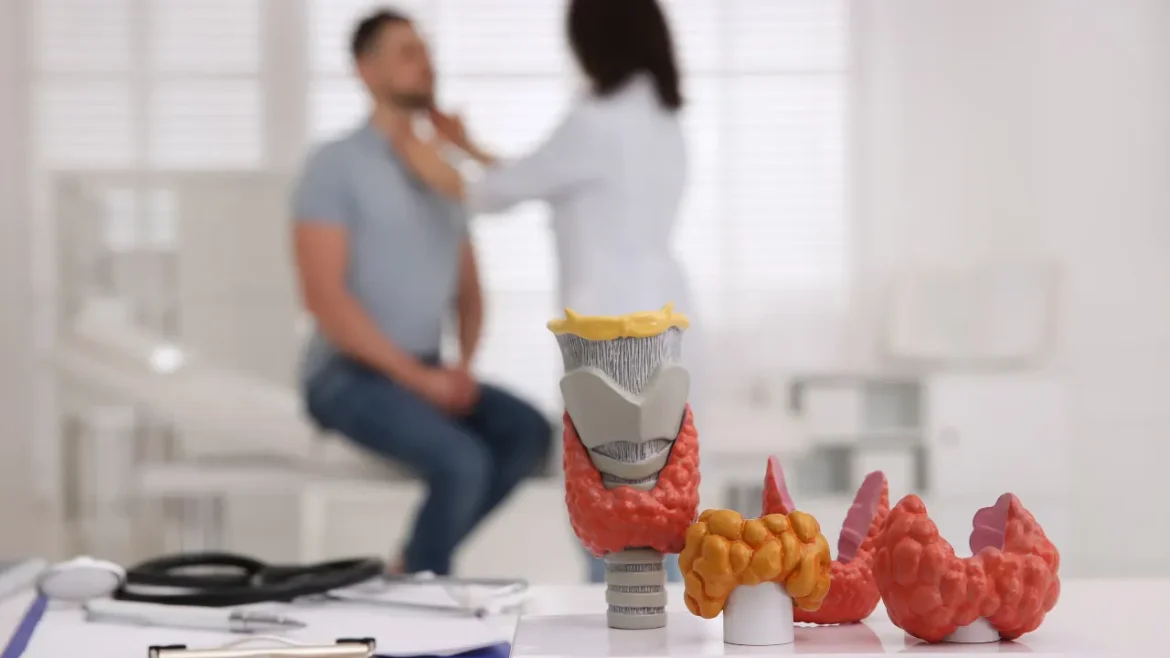Description
The term “autoimmune polyglandular syndromes” refers to a variety of diseases that exhibit a wide range of clinical manifestations, underlying causes, and therapeutic modalities. To improve patient outcomes, APS must be understood by patients and professionals alike in all of their complexity because of how difficult the medical illnesses can manifest. Multiple endocrine glands are mistakenly attacked by the immune system in APS, resulting in inflammation and malfunction of those glands.
There are three main forms of APS, each one having unique clinical characteristics and underlying reasons:
APS Type 1 (APS-1) or Autoimmune Polyendocrinopathy-Candidiasis-Ectodermal Dystrophy (APECED): A rare and genetic condition called APS Type 1 often shows up in childhood, frequently before the patient five years old. It is caused by mutations in the gene for the autoimmune regulator (AIRE), which is essential for preserving immunological tolerance. To promote central immunological tolerance, the AIRE gene directs the thymus to expose growing T cells to a wide variety of self-antigens. This tolerance mechanism malfunctions in APS-1 due to the genetic mutation, enabling autoreactive T-cells to leave the thymus and target the body’s own tissues.
Clinical characteristics of APS Type 1:
- Hypoparathyroidism
Reduced levels of calcium within a person’s blood or the presentation of hypocalcemia are caused by inadequate parathyroid hormone (PTH) synthesis or secretion. These may result in symptoms like tingling, muscle cramps, and convulsions.
- Addison’s Disease
Low levels of cortisol and aldosterone are produced as a result of adrenal insufficiency brought on by the immune system’s degeneration of the adrenal cortex. Low blood pressure, weakness, and weariness are possible symptoms.
- Mucocutaneous Candidiasis
Candida infections are chronic and recurrent conditions that affect the mucous membranes and skin, notably those that affect the throat and mouth.
- APS Type 2 (APS-2) or Schmidt syndrome: The most prevalent type of autoimmune polyglandular syndrome, APS Type 2, primarily impacts young to middle-aged adults. It is usually connected to autoimmune thyroid disorder and type 1 diabetes, along with various endocrine issues.
Clinical features of APS Type 2:
- Type 1 Diabetes Mellitus
A disorder that causes insulin insufficiency and elevated blood sugar levels by the body’s immune system targeting and eliminating insulin-secreting beta cells inside the pancreas.
- Autoimmune Thyroid Disease
The thyroid may be hyperactive (Graves’ disease) or underactive (Hashimoto’s thyroiditis) in this situation.
- Other Endocrine Disorders
Additional endocrine gland malfunctions associated with APS-2 include hypoparathyroidism, primary ovarian failure, and adrenal insufficiency.
APS Type 3 (APS-3):
Uncertainty surrounds APS Type 3, which frequently involves autoimmune thyroid illness in addition to other autoimmune diseases including pernicious anemia, rheumatoid arthritis, or vitiligo. APS-3 is a more diverse group than APS-1 and APS-2 since it lacks a known genetic etiology or a distinct set of endocrine dysfunctions.
You May Also Like:
THE PROS’ SECRET TO OPTIMUM WORKOUTS: THE INFLAMMATION CLEANSE
Autoimmune polyglandular syndromes, types I, II, & III (APS type 1, APS type 2, APS type 3, APECED): Description, Causes, And Treatment Protocol is an original (HealthXWire) article.
Possible Causes
APS has a complex etiology that includes immunological dysregulation, environmental stressors, and genetic predisposition. There may be a genetic component as some HLA or human leukocyte antigen variants have been associated with higher susceptibility. In those persons with APS, environmental factors, including infections or being exposed to particular medicines, may be the cause.
Exacerbating and Mitigating Factors
The development and outlook for Autoimmune Polyglandular Syndromes (APS) are significantly influenced by aggravating and mitigating factors. These elements may have an impact on the disorder’s clinical symptoms and how severe the autoimmune response is. Following are some typical APS aggravating and moderating factors:
Exacerbating Factors:
Infections: Infections from bacteria or viruses can cause APS by boosting the immune system. In those who are sensitive, infections may trigger autoimmune flare-ups or exacerbate pre-existing symptoms.
Stress: In people with APS, physical or emotional stress can set off and worsen autoimmune reactions. Stress affects the immune system of the body, increasing pro-inflammatory cytokines that might exacerbate preexisting symptoms.
Hormonal Changes: Hormone fluctuations, like those experienced during menopause, pregnancy, or postpartum, might affect the body’s immune system and cause or exacerbate APS symptoms.
Medications: Specific drugs, particularly those that impact the immune system, may either encourage or inhibit autoimmune reactions. For instance, immunosuppressive treatments can help moderate the autoimmune response whereas immune-stimulating therapies may make APS symptoms worse.
Environmental Triggers: In those who are genetically predisposed, exposure to specific environmental elements, such as poisons or chemicals, may cause or worsen APS.
Autoimmune Comorbidities: In conjunction with APS, having additional autoimmune diseases can put more strain on the body’s immune system as a whole, potentially exacerbating symptoms.
Diet and Lifestyle: Sedentary habits and poor nutritional choices can lead to immunological dysregulation and inflammation, which could exacerbate APS symptoms.
Mitigating Factors:
Infection Prevention: Maintaining good cleanliness and having the required vaccinations will help lower the possibility of infections causing APS episodes.
Stress Management: Applying stress-reduction strategies like mindfulness exercises, meditation, or counseling can lessen the negative effects of stress on immune function and APS symptoms.
Hormone Regulation: Careful hormone treatment throughout pregnancy, childbirth, and menopause for female APS patients can reduce symptom aggravation.
Medication Adherence: Taking prescription medications consistently, notably immunosuppressive medications, as advised by healthcare specialists, can help moderate an autoimmune reaction and effectively manage symptoms.
Environmental Awareness: Avoiding recognized environmental triggers or suspected allergens may help lower the possibility of APS symptoms worsening.
Regular Monitoring: Medical professionals can track the development of the disease, modify therapies as necessary, and identify exacerbations early by scheduling routine follow-up appointments and laboratory tests.
Avoidance of Triggers: APS flare ups can be prevented in part by recognizing and avoiding particular triggers, like specific drugs or allergies.
Healthy Eating and Lifestyle: Consuming a well-balanced, nutrient-rich diet and engaging in regular exercise promotes general health and possibly assists in immune system regulation.

Standard Treatment Protocol
When treating the multiple endocrine abnormalities associated with Autoimmune Polyglandular Syndromes (APS), a multifaceted strategy is frequently necessary. Managing symptoms, replenishing missing hormones, and reducing the autoimmune response are the main goals of treatment. Common components of the APS treatment procedure include:
Hormone Replacement Therapy: APS care focuses on supplementing the hormones which the afflicted endocrine glands are no longer able to produce.
- Hypoparathyroidism
Vitamin D and calcium supplements are taken for this.
- Thyroid Dysfunction
For hypothyroidism, thyroid hormone supplementation is involved.
- Addison’s Disease or adrenal insufficiency
Aldosterone and cortisol replenishment are involved.
Immunosuppressive Medications: Immunosuppressive medications may be used to minimize inflammation and the autoimmune response. Commonly prescribed drugs include:
- Immunosuppressive agents
In more severe circumstances, methotrexate, mycophenolate mofetil, and azathioprine might be administered.
- Corticosteroids
To inhibit immunological activity, doctors frequently administer prednisone and dexamethasone.
Blood Sugar Control: Diabetes type 1 patients must control their blood sugar levels through insulin therapy and modification of lifestyle in order to avoid problems.
Regular Monitoring: Monitoring the levels of hormones, blood glucose levels, and general health requires frequent follow-up appointments and laboratory tests. According to the outcomes, medication dosages can be modified.


Treatment Options
Some APS patients may gain from adjunct therapies along with the usual treatment plan. The following are a few APS supplemental treatment options:
Nutritional Supplements:
- Omega-3 Fatty Acids
These necessary fats might be anti-inflammatory and advantageous to general health. Omega-3 fatty acid supplements constitute a typical source of these compounds.
- Vitamin D
Inflammation may reduce and immunological function may be supported by adequate vitamin D levels. In particular, for people who lack vitamin D, supplementation is frequently advised.
- Probiotics
Probiotics can support the maintenance of healthy gut flora, potentially affecting autoimmune reactions. Gut health serves a crucial role in immune control.
Herbal Remedies:
- Ashwagandha (Withania somnifera)
This plant has immunomodulatory effects and may help alleviate stress, which can cause autoimmune flare-ups.
- Turmeric (Curcuma longa)
The major ingredient in turmeric, curcumin, contains anti-inflammatory properties and may help maintain overall immunological function.
- Astragalus (Astragalus membranaceus)
The herb has a long history of usage in Chinese medication and is known to boost adrenal health and immunological function.
Mind-Body Techniques:
- Yoga
Additionally, relaxing yoga routines can boost immunity, reduce stress, and enhance general well-being.
- Meditation
Using relaxation and immune system calming, minimizing stress through meditation might have a favorable effect on autoimmune reactions.
Dietary Modifications:
- Gluten-Free Diet
Eliminating gluten from one’s diet can relieve symptoms and possibly lessen the autoimmune reaction in those with celiac disease or gluten sensitivity.
- Anti-inflammatory Diet
Reducing inflammation and promoting immunological health can be accomplished by prioritizing whole meals, fresh produce, healthy fats, and minimally consuming processed foods along with added sugars.
Helpful adjunct therapies might be for people with APS, but they ought not take the place of accepted medical practices; it is crucial to remember this. For optimal safety and suitability for each individual’s particular circumstance, these adjunct choices should be utilized under the direction of healthcare professionals.


Conclusion:
Autoimmune polyglandular syndromes are a family of diseases that are complex and have grave physical consequences. These disorders often are comorbid with other conditions, and they can exacerbate one another. The treatment protocol for these disorders is complex and multifaceted. It is possible to manage this family of disorders with lifestyle changes, medications, supportive care, and balanced nutrition. The immune and endocrine systems are affected the most within people afflicted with APS, which are systems that are crucial to sustaining overall health. Please perform your due diligence regarding treatment and care when living with or caring for someone with APS, including considering the information presented in this article.


References:
1. “Autoimmune Polyglandular Syndromes.” Retrieved from: https://www.ncbi.nlm.nih.gov/books/NBK279152/
2. “What is Polyglandular syndromes type I, II, III.” Retrieved from: https://autoimmune.org/disease-information/polyglandular-syndromes-type-ii-iii/
3. “Polyglandular Deficiency Syndromes.” Retrieved from: https://www.merckmanuals.com/professional/endocrine-and-metabolic-disorders/polyglandular-deficiency-syndromes/polyglandular-deficiency-syndromes
4. “Autoimmune Polyglandular Syndromes.” Retrieved from: https://www.nejm.org/doi/full/10.1056/NEJMra1713301
Important Note: The information contained in this article is for general informational purposes only, and should not be construed as health or medical advice, nor is it intended to diagnose, prevent, treat, or cure any disease or health condition. Before embarking on any diet, fitness regimen, or program of nutritional supplementation, it is advisable to consult your healthcare professional in order to determine its safety and probable efficacy in terms of your individual state of health.
Regarding Nutritional Supplements Or Other Non-Prescription Health Products: If any nutritional supplements or other non-prescription health products are mentioned in the foregoing article, any claims or statements made about them have not been evaluated by the U.S. Food and Drug Administration, and such nutritional supplements or other health products are not intended to diagnose, treat, cure, or prevent any disease.
Table of Contents


